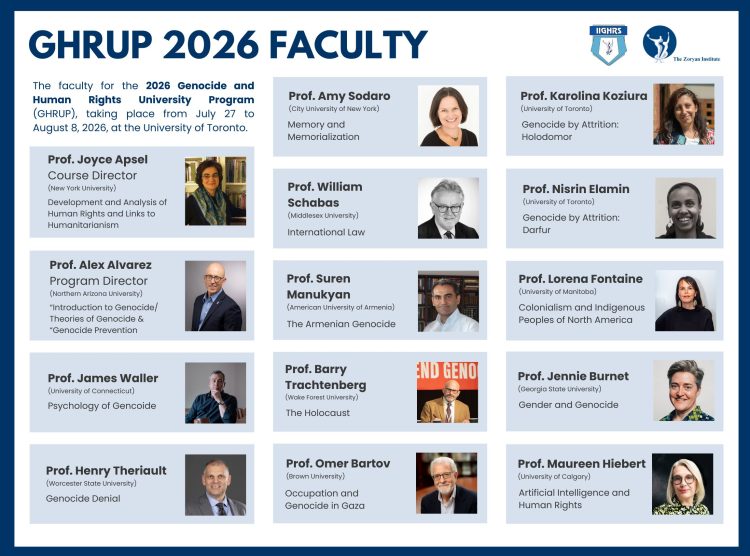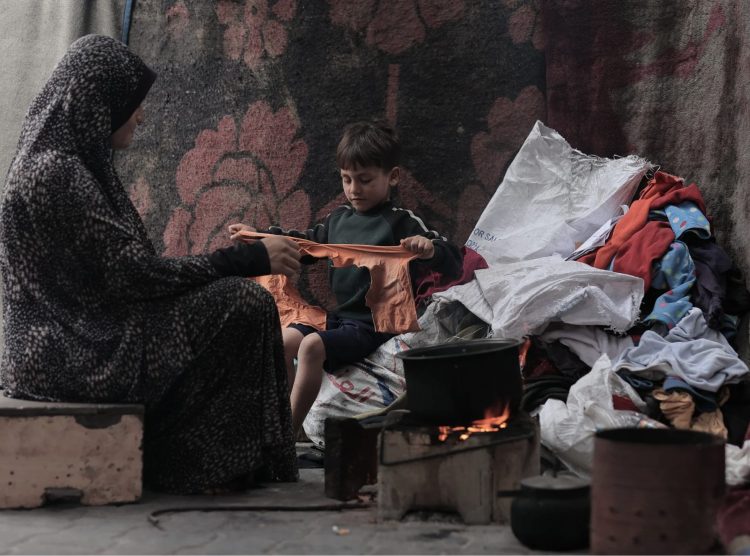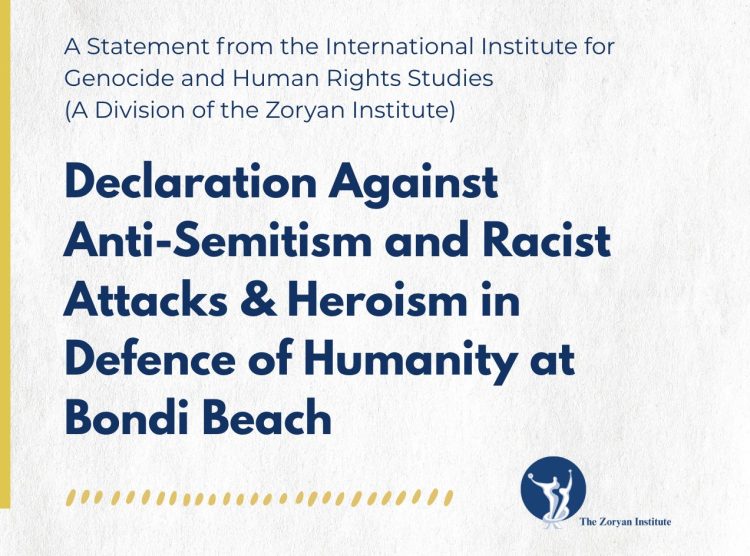Article
Domicide and the Meaning of Home: The Zoryan Institute and the Balsillie School of International Affairs Announce Joint Panel Discussion
08 Sep 2025
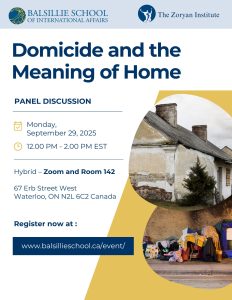
September 8, 2025: The Zoryan Institute is pleased to announce a panel discussion, Domicide and the Meaning of Home, hosted in partnership with the Balsillie School of International Affairs in Waterloo, ON and co-hosted by its Migration, Mobilities, and Social Politics research cluster and the Security and Conflict research cluster. This panel, taking place from 12-2 PM EST on Monday, September 29th, 2025, will explore the discuss the concept of “domicide” and how this can be applied to contemporary cases of violence that we are witnessing around the globe today.
Domicide refers to the deliberate and systematic destruction of living spaces or homes as a tool to displace or control populations of people. This can include the physical destruction of buildings and the erosion of a community’s sense of belonging. The Zoryan Institute and the BSIA are pleased to be welcoming leading scholars and experts from a variety of disciplines and backgrounds on this subject to introduce and contextualize the concept of domicide, and to draw important parallels to what we are witnessing in Ukraine, Gaza, Myanmar, Canada, and Nagorno-Karabakh today.
Featured Topics & Panellists
“An Introduction to Domicide, the Human Right to Home and Ukraine”
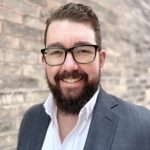 Dr. Andrew Basso (Adjunct Professor at Wilfrid Laurier University) is a political scientist who studies atrocity crimes (genocide, crimes against humanity, and war crimes) and political violence, international human rights laws and norms, transitional justice in theory and practice, and security and strategic studies.
Dr. Andrew Basso (Adjunct Professor at Wilfrid Laurier University) is a political scientist who studies atrocity crimes (genocide, crimes against humanity, and war crimes) and political violence, international human rights laws and norms, transitional justice in theory and practice, and security and strategic studies.
Dr. Basso’s research focusses specifically on processes of forced displacement as a method of atrocity perpetration, domicide (the intentional destruction of homes) as a human rights violation and breach of the laws of armed conflict, and barriers to Indigenous-Settler [Re]conciliation in Canada.
His latest publications include Shallow River of Tears: Canada’s Stalled Paths to Reconciliation (McGill-Queen’s University Press, 2026), Destroy Them Gradually: Displacement As Atrocity (Rutgers University Press, 2024), From Bureaucracy to Bullets: Extreme Domicide and the Right to Home. (Rutgers University Press, 2022).
“Genocide and Relationality: The Disruption of Connections to Land and Home”
Dr. Chris Powell (Associate Professor, Toronto Metropolitan University; he/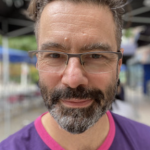 they) is a settler Canadian sociological theorist who has studied and written on anti-genocide, relational theory, and libertarian socialism. His works include Barbaric Civilization: A Critical Sociology of Genocide (McGill-Queens University Press, 2011); “Radical Relationism: A Proposal” in Conceptualizing Relational Sociology: Ontological and Theoretical Issues (Palgrave, 2013); “Revitalizing the Ethnosphere: Global Security, Ethnodivesity, and the Stakes of Cultural Genocide” (Genocide Studies and Prevention, 2016); and “Radical Complexity: Using Concepts from Complex Systems Theory to Think About Socialist Transformation” (New Proposal: Journal of Marxism and Interdisciplinary Theory, 2023).
they) is a settler Canadian sociological theorist who has studied and written on anti-genocide, relational theory, and libertarian socialism. His works include Barbaric Civilization: A Critical Sociology of Genocide (McGill-Queens University Press, 2011); “Radical Relationism: A Proposal” in Conceptualizing Relational Sociology: Ontological and Theoretical Issues (Palgrave, 2013); “Revitalizing the Ethnosphere: Global Security, Ethnodivesity, and the Stakes of Cultural Genocide” (Genocide Studies and Prevention, 2016); and “Radical Complexity: Using Concepts from Complex Systems Theory to Think About Socialist Transformation” (New Proposal: Journal of Marxism and Interdisciplinary Theory, 2023).
He is co-chair of the International School of Radical Relationism, a network of scholars using relational thinking to articulate visions of decolonial, emancipatory, and egalitarian social transformation, and is currently co-editing a collection of works by members of this network. Dr. Powell teaches as an Associate Professor at Toronto Metropolitan University.
“Biopsychsocial Implications of Domicide, Palestine, and Rohingyas”
(Zoom Session)

Dr. Bree Akesson (Associate Professor at Wilfrid Laurier University) is a Canada Research Chair (Tier II) in Global Adversity and Wellbeing and a Full Professor at Wilfrid Laurier University’s Faculty of Social Work. She serves as Associate Director of the Centre for Research on Security Practices and is affiliated with several academic centers, including Columbia University’s Program on Forced Migration and Health and McGill University’s Centre for Research on Children and Families. Her interdisciplinary work focuses on the intersections of adversity, displacement, and wellbeing, with a particular emphasis on children and families affected by conflict, migration, and climate change. Working with war-affected populations in contexts such as Chechnya, Palestine, Lebanon, Afghanistan, and Bangladesh, her research on domicide, forced migration, and refugee wellbeing has been widely published and funded by SSHRC, UNICEF, USAID, and others. She brings deep expertise in socio-spatial methods, trauma-informed research, and global public health. Through partnerships with local organizations and institutions, her work translates academic insight into practical solutions for some of the world’s most vulnerable populations.
“Slow Motion Genocide: The Destruction of Homes and Social Relations in Gaza”
(Zoom Session)
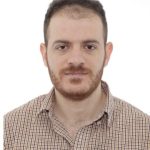 Mohammed Nijim (PhD Candidate at Carleton University) is a PhD Candidate in the Department of Sociology and Anthropology at Carleton University. His research focuses on violent processes inflicted upon Palestinians, including physical and ontological destruction, warfare and the domicide, and issues related to refugee status and humanitarian access.
Mohammed Nijim (PhD Candidate at Carleton University) is a PhD Candidate in the Department of Sociology and Anthropology at Carleton University. His research focuses on violent processes inflicted upon Palestinians, including physical and ontological destruction, warfare and the domicide, and issues related to refugee status and humanitarian access.
“The Disruption of Daily Life in Gaza”
 Dr. Sonya Fatah (Associate Chair and Associate Professor, Toronto Metropolitan University) is an associate professor at Toronto Metropolitan University’s School of Journalism, where she has taught since 2017. Sonya’s teaching, research and practice are invested in areas of community-based live journalism, representation in the newsroom, press freedoms and media narratives on international reporting.
Dr. Sonya Fatah (Associate Chair and Associate Professor, Toronto Metropolitan University) is an associate professor at Toronto Metropolitan University’s School of Journalism, where she has taught since 2017. Sonya’s teaching, research and practice are invested in areas of community-based live journalism, representation in the newsroom, press freedoms and media narratives on international reporting.
Sonya is the founder and director of stitched! a community-based, interdisciplinary live journalism studio at the Creative School, and is the co-lead of the Canada Press Freedom Project, which received its seed funding from the Michener Foundation.
As a career journalism practitioner, Sonya has worked across mediums in a largely global context. She has studied and worked in China, India, Pakistan, South Africa, the United States, Russia and Canada. Most of Sonya’s working life as a journalist was spent overseas in India and Pakistan, covering South Asia for Canadian and U.S. publications. She was reporter-on-assignment for the Globe and Mail and later a special correspondent for the Toronto Star. She was India correspondent for the Boston-based GlobalPost, now PRI. In addition to her journalism, she also develops audio documentaries and created a full-length feature doc, I, DANCE.
“From Land as Commodity to Territory as Medium for Social Relations, Registry of History, and Foundation for Future”
(Zoom Session)
 Dr. Henry C. Theriault (Associate Provost, Worcester State University) is Associate Provost at Worcester State University in the United States, after teaching in its Philosophy Department 1998-2017. He coordinated WSU’s Human Rights Center 1999-2007. With a background in radical social and political as well as continental philosophy, Theriault researches genocide denial, genocide prevention, post-genocide victim-perpetrator relations, reparations, and mass violence against women and girls.
Dr. Henry C. Theriault (Associate Provost, Worcester State University) is Associate Provost at Worcester State University in the United States, after teaching in its Philosophy Department 1998-2017. He coordinated WSU’s Human Rights Center 1999-2007. With a background in radical social and political as well as continental philosophy, Theriault researches genocide denial, genocide prevention, post-genocide victim-perpetrator relations, reparations, and mass violence against women and girls.
He has lectured around the world and published numerous journal articles and chapters. He is lead author of the Armenian Genocide Reparations Study Group’s 2015 Resolution with Justice, and, with Samuel Totten, co-authored The United Nations Genocide Convention: An Introduction (University of Toronto Press, 2019), and, with Chunhui Peng, coeditor of Aftermath of Mass Violence: A Comprehensive Approach through Theory and Case Studies (Bloomsbury, forthcoming). Theriault’s work has appeared in English, Spanish, Armenian, Turkish, and other languages. Theriault served two terms as president of the International Association of Genocide Scholars, 2017-2019 and 2019-2021.
He has been a founding co-editor of Genocide Studies International since 2012 and co-edited Genocide Studies and Prevention 2007-2012. He currently serves as vice-chair of the executive committee of the board of directors of the National Association for Armenian Studies and Research and is a member of the Armenian Society of Fellows.
How to Register
As spaces are limited, please register for this event, whether in person or online, in advance. Please visit the following page to RSVP today:
https://balsillieschool.ca/event/domicide-and-the-meaning-of-home/.


 Dr. Andrew Basso (Adjunct Professor at Wilfrid Laurier University) is a political scientist who studies atrocity crimes (genocide, crimes against humanity, and war crimes) and political violence, international human rights laws and norms, transitional justice in theory and practice, and security and strategic studies.
Dr. Andrew Basso (Adjunct Professor at Wilfrid Laurier University) is a political scientist who studies atrocity crimes (genocide, crimes against humanity, and war crimes) and political violence, international human rights laws and norms, transitional justice in theory and practice, and security and strategic studies. they) is a settler Canadian sociological theorist who has studied and written on anti-genocide, relational theory, and libertarian socialism. His works include Barbaric Civilization: A Critical Sociology of Genocide (McGill-Queens University Press, 2011); “Radical Relationism: A Proposal” in Conceptualizing Relational Sociology: Ontological and Theoretical Issues (Palgrave, 2013); “Revitalizing the Ethnosphere: Global Security, Ethnodivesity, and the Stakes of Cultural Genocide” (Genocide Studies and Prevention, 2016); and “Radical Complexity: Using Concepts from Complex Systems Theory to Think About Socialist Transformation” (New Proposal: Journal of Marxism and Interdisciplinary Theory, 2023).
they) is a settler Canadian sociological theorist who has studied and written on anti-genocide, relational theory, and libertarian socialism. His works include Barbaric Civilization: A Critical Sociology of Genocide (McGill-Queens University Press, 2011); “Radical Relationism: A Proposal” in Conceptualizing Relational Sociology: Ontological and Theoretical Issues (Palgrave, 2013); “Revitalizing the Ethnosphere: Global Security, Ethnodivesity, and the Stakes of Cultural Genocide” (Genocide Studies and Prevention, 2016); and “Radical Complexity: Using Concepts from Complex Systems Theory to Think About Socialist Transformation” (New Proposal: Journal of Marxism and Interdisciplinary Theory, 2023).
 Mohammed Nijim (PhD Candidate at Carleton University) is a PhD Candidate in the Department of Sociology and Anthropology at Carleton University. His research focuses on violent processes inflicted upon Palestinians, including physical and ontological destruction, warfare and the domicide, and issues related to refugee status and humanitarian access.
Mohammed Nijim (PhD Candidate at Carleton University) is a PhD Candidate in the Department of Sociology and Anthropology at Carleton University. His research focuses on violent processes inflicted upon Palestinians, including physical and ontological destruction, warfare and the domicide, and issues related to refugee status and humanitarian access. Dr. Sonya Fatah (Associate Chair and Associate Professor, Toronto Metropolitan University) is an associate professor at Toronto Metropolitan University’s School of Journalism, where she has taught since 2017. Sonya’s teaching, research and practice are invested in areas of community-based live journalism, representation in the newsroom, press freedoms and media narratives on international reporting.
Dr. Sonya Fatah (Associate Chair and Associate Professor, Toronto Metropolitan University) is an associate professor at Toronto Metropolitan University’s School of Journalism, where she has taught since 2017. Sonya’s teaching, research and practice are invested in areas of community-based live journalism, representation in the newsroom, press freedoms and media narratives on international reporting. Dr. Henry C. Theriault (Associate Provost, Worcester State University) is Associate Provost at Worcester State University in the United States, after teaching in its Philosophy Department 1998-2017. He coordinated WSU’s Human Rights Center 1999-2007. With a background in radical social and political as well as continental philosophy, Theriault researches genocide denial, genocide prevention, post-genocide victim-perpetrator relations, reparations, and mass violence against women and girls.
Dr. Henry C. Theriault (Associate Provost, Worcester State University) is Associate Provost at Worcester State University in the United States, after teaching in its Philosophy Department 1998-2017. He coordinated WSU’s Human Rights Center 1999-2007. With a background in radical social and political as well as continental philosophy, Theriault researches genocide denial, genocide prevention, post-genocide victim-perpetrator relations, reparations, and mass violence against women and girls.